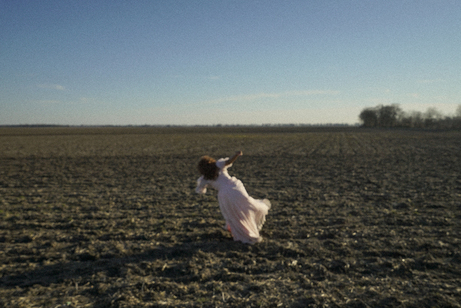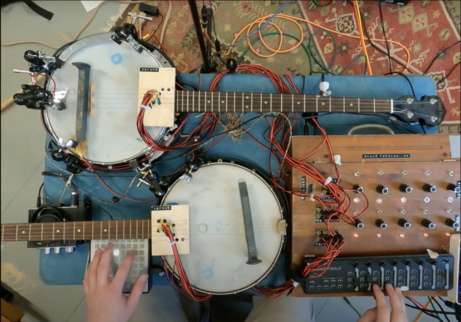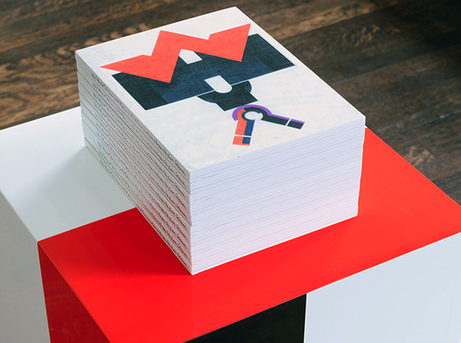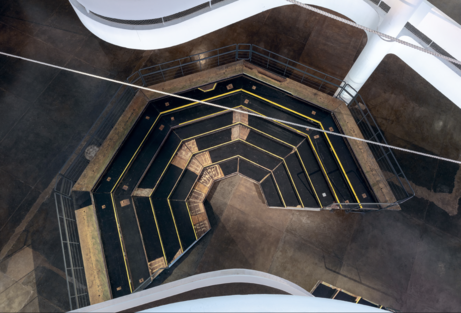A different kind of tender and the practice of overhealing: Opening Reception
Katherine Simóne Reynolds
Mar 25, 2023
(4pm)
Opening Reception
RSVP required
Join us for a reception from 4–6 p.m. with artist Katherine Simóne Reynolds to celebrate the opening of her new exhibition A different kind of tender and the practice of overhealing.
Katherine Simóne Reynolds practice investigates emotional dialects and psychogeographies of Blackness, and the importance of “anti-excellence.” Her work physicalizes emotions and experiences by constructing pieces that include portrait photography, video works, choreography, sculpture, and installation. Taking cues from the midwestern post-industrial melancholic landscape having grown up in the metro east area of Saint Louis, she formed an obsessive curiosity around the practices of healing as well as around a societal notion of progress spurning from a time of industrial success. Utilizing Black embodiment and affect alongside her own personal narrative as a place of departure has made her question her own navigation of ownership, inclusion, and authenticity within a contemporary gaze. She draws inspiration from Black glamour and beauty while interrogating the notion of “authentic care.” Her practice generally deals in Blackness from her own perspective, and she continuously searches for what it means to produce “Black Work.”
Reynolds has exhibited and performed work within many spaces and institutions including the Pulitzer Arts Foundation; The Museum of Modern Art; and SculptureCenter. She has exhibited in national and international group and solo shows, has spoken at the Contemporary Art Museum of Saint Louis, the Saint Louis Art Museum, and the Black Midwest Initiative Symposium at University of Minnesota. Alongside her visual art practice, she has embarked on curatorial projects at The Luminary; SculptureCenter; and upcoming exhibitions for Stanley Museum of Art as well as Clyfford Still Museum.
For more information on the exhibition, A different kind of tender and the practice of overhealing, click here.

Gallery and Bookshop Hours, "A different kind of tender and the practice of overhealing"
Mar 25, 2023 - Jun 10, 2023
(12pm)
Free admission, reservations required
Through June 10, 2023
Gallery and Bookshop Hours
Wednesday–Saturday, 12–5 p.m.
For gallery hours and timed-entry reservations, click here to book on tock.com/grahamfoundation
Visitor Guidelines
Please note: The first-floor galleries and bookshop are accessible via outdoor lift. Please call ahead to make arrangements. The second-floor galleries and the third-floor ballroom, where events are held, are only accessible by stairs.
Group tours available by request, contact us at info@grahamfoundation.org
For more information on the exhibition, A different kind of tender and the practice of overhealing, click here.

Weston Olencki
Lampo Performance Series
Mar 11, 2023
(4pm)
Performance
Reservations required; limited capacity
In recent projects Weston Olencki has explored fusions of experimentalism and noise with American traditional music. At the Graham, they premiere new work for pump organ, Sacred Harp hymnody, and electronic synthesis, and offer a vine that grew over the city and no one noticed for electromechanical banjo, magnetic resonators, solenoid motors, AM radio transmitters, handheld radio, railroad spikes, carriage bolts, Markov-driven three-finger banjo picking, and a neural net-generated resynthesis of The Carter Family’s Will the Circle Be Unbroken (1935) as “performed” by the reanimated and digitized voices of Johnny Cash, Dolly Parton, Hank Williams, Charley Pride, Elizabeth Cotten, Jimmie Rodgers, Buck Owens, Loretta Lynn, Uncle Dave Macon, and Willie Nelson.
Weston Olencki (b.1992; Spartanburg, South Carolina) is a musician, composer, and sound artist based in Berlin, Germany. Their current work is centered around questions of instrumental music and its contexts and constructs, various mediated practices of listening and improvisation, and the technological, material, and cultural histories of rural space and time.
They have presented work at the Borealis Festival, Issue Project Room, REDCAT, Donaueschinger Musiktage, Ghent Jazz Festival, Philharmonie Luxembourg, Black Mountain College, Musica Nova Helsinki, the American Academy in Rome, Roulette Intermedium, and Frequency Festival, among other festivals and venues. Residencies include CalArts, Columbia, Harvard, NYU, Northwestern, Princeton, Stanford, and the University of Huddersfield. In 2016 they were awarded the Kranichsteiner Musikpreis from the Internationales Musikinstitut Darmstadt. Their recording project Old Time Music (Tripticks Tapes) was named in Bandcamp’s “best of” 2022 music round-up. They have an extensive discography, with upcoming releases on Astral Spirits and Infrequent Seams. Olencki is an active member of Rage Thormbones, the Wet Ink Large Ensemble, Ensemble Pamplemousse, Clone Decay (with Mary Halvorson and Kalia Vandever), the Hollows (with Nick Dunston and Etienne Nillesen), and other projects, and performs regularly as a soloist and ensemble member on low brass instruments, winds, banjo, organs, and various electronic media.
Image: Courtesy the artist
Presented in partnership with Lampo
Lampo, established in 1997, supports artists working in new music, experimental sound and other interdisciplinary practices. The Chicago-based organization's core activity has been and remains its performance series. Rather than making programming decisions around tour schedules, Lampo invites selected artists to create and perform new work, and then the organization provides the space, resources and curatorial support to help them fulfill their vision. Lampo also organizes artist talks, lectures, screenings and workshops, and publishes written and recorded documents related to its series.
Visitor Guidelines: Masks are strongly encouraged. Visitors to the Graham Foundation understand that there is an inherent risk of exposure to COVID-19 in any public space where people are present. When masks are required, they must cover the nose and mouth at all times and meet CDC standards. Disposable masks are available upon request and will be provided to visitors as required.
Accessibility: Events are held in the ballroom on the third floor, which is only accessible by stairs. Please contact us at 312.787.4071 or info@grahamfoundation.org to make arrangements.

Bookshop Sale
Feb 22, 2023 - Feb 25, 2023
(12pm)
Free admission, reservations required
Visit the galleries during the winter bookshop sale in the final week of our current exhibitions, Pidgeon Audio Visual: Architects Speak for Themselves and Barbara Stauffacher Solomon: Exits Exist. All purchases in the bookshop will be 15% off with additional markdowns on select titles.
For gallery hours and timed-entry reservations, click here to book on tock.com/grahamfoundation
Visitor Guidelines
Please note: The audio component of the Pidgeon Audio Visual installation is only accessible to stream in the galleries through the exhibition's dedicated website on a mobile device. The use of a personal mobile device is encouraged and headphones are required. Headphones and chargers are available for use as needed.
The first-floor galleries and bookshop are accessible via outdoor lift. Please call ahead to make arrangements. The second-floor galleries and the third-floor ballroom, where events are held, are only accessible by stairs.
Group tours available by request

deposition
Marissa Lee Benedict, Daniel de Paula, David Rueter, and Karsten Lund
Feb 22, 2023
(6pm)
Book Launch
Free; RSVP required
Join us for a discussion and presentation of deposition, a project by Marissa Lee Benedict, Daniel de Paula, and David Rueter centered on the displacement, exhibition, and reprogramming of a large-scale trading pit, salvaged from the grain room of the Chicago Board of Trade. In 2021, the obsolete seven-tier commodity trading pit floor was relocated to the center of Oscar Niemeyer’s Ciccillo Matarazzo for the 2021 São Paulo Biennial with support from a grant from the Graham Foundation. Benedict, de Paula, and Rueter will be joined by Karsten Lund, editor of their new book from Mousse Publishing that documents the project. Copies will be available for purchase in the Graham Foundation bookshop following the discussion.
About the publication:
Proceeding from the iconic installation deposition (2018–ongoing) by artists Marissa Lee Benedict, Daniel de Paula, and David Rueter in the central atrium of Oscar Niemeyer’s pavilion for the 34th Bienal de São Paulo, this volume traces the salvage, displacement, and exhibition of the last corn commodities futures trading pit from the Chicago Board of Trade. Essays and interviews provide divergent lenses from which to view the work, moving from intimate to distant, scanning over the object, the artists, the art institution, and the architectures of the geopolitical landscape in which these elements operate. Section by section, the book works through the multiple, and compacted, meanings of the word “deposition” (geologic, legal, art historical), layering images and texts to build concrete yet non-linear relations, as the 32 fragments of the former trading floor are dragged from Chicago to São Paulo.
deposition (Mousse Publishing, 2023) features the work of Marissa Lee Benedict, David Rueter, Daniel De Paula, and is edited by Karsten Lund with text by Yamila Goldfarb, Cameron Hu, and Ana Teixeira Pinto.
Daniel de Paula is a Brazilian visual artist and researcher. de Paula has been awarded the Mondriaan Funds Proven Talent Award and has exhibited widely at institutions such as MASP, São Paulo; The Renaissance Society, Chicago; Padiglione d’Arte Contemporanea, Milan; Kunsthal Gent; The Arts Club of Chicago; Estação Pinacoteca, São Paulo; and the 2022 Lyon Biennale. His work is represented by Francesca Minini Gallery and Lumen Travo Gallery, and has been reviewed in Artforum, Texte zur Kunst, Flash Art, Mousse Magazine, Folha de São Paulo, and Het Parool. He has participated in several international artistic residencies such as the Jan van Eyck Academie, FLACC, and KIOSKO.
Marissa Lee Benedict and David Rueter are visual artists, writers, and researchers working in collaboration since 2014. Benedict and Rueter have exhibited works at The US Pavilion for the 2018 Venice Architecture Biennale; The Arts Club of Chicago; The Museum of Contemporary Photography, Chicago; The Renaissance Society at the University of Chicago; and Contemporary Art Brussels, amongst others. They have received major grants from institutions such as the National Endowment for the Arts and the Joan Mitchell Foundation. Their work has been reviewed by publications such as Artforum, Revista, Agenda Magazine, and Hyperallergic. They have collaboratively participated in numerous international artistic residencies including Rupert, the Banff Centre, and the Jan van Eyck Academie.
It was at the Jan van Eyck Academie in 2018 that Benedict, de Paula and Rueter began their collaborative work deposition (2018–ongoing) with the salvage of the last remaining commodities trading pit from the Chicago Board of Trade. Their work has been awarded individual grant support from the Graham Foundation for Advanced Studies in the Fine Arts, and has been exhibited at the 34th Bienal de São Paulo, The Arts Club of Chicago, and The Renaissance Society.
Karsten Lund is curator at the Renaissance Society at the University of Chicago, where he organizes exhibitions, edits publications, and oversees public programs. His most recent exhibitions include new commissions by Haig Aivazian (2021), Jill Magid (2021), Matthew Metzger (2021), and LaToya Ruby Frazier (2019, cocurated with Solveig Øvstebø), as well as group shows such as Nine Lives (2020, with Caroline Picard) and Unthought Environments (2018). His latest group exhibition, Fear of Property (2022), features new work by Benedict, de Paula and Rueter, an off-shoot of deposition (2018-ongoing), and he has acted as editor for a monograph on the work (of the same name) that is being released in 2023 by Mousse Publishing. As an editor, Lund works on three to four books every year at the Renaissance Society, including recent titles by Kevin Beasley and Jill Magid. He has also independently edited volumes such as the Graham Foundation-supported Spells by Irena Haiduk (Sternberg Press, 2015).
Image: Installation view, deposition, 34th Bienal de São Paulo, 2021. Photo: Everton Ballardin





 PREVIOUS POSTS
PREVIOUS POSTS